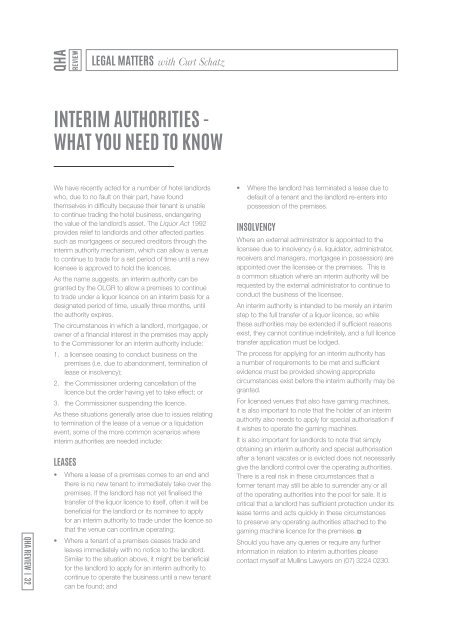QHA_March 2018_Electronic_s
You also want an ePaper? Increase the reach of your titles
YUMPU automatically turns print PDFs into web optimized ePapers that Google loves.
LEGAL MATTERS with Curt Schatz<br />
INTERIM AUTHORITIES -<br />
WHAT YOU NEED TO KNOW<br />
<strong>QHA</strong> REVIEW | 32<br />
We have recently acted for a number of hotel landlords<br />
who, due to no fault on their part, have found<br />
themselves in difficulty because their tenant is unable<br />
to continue trading the hotel business, endangering<br />
the value of the landlord’s asset. The Liquor Act 1992<br />
provides relief to landlords and other affected parties<br />
such as mortgagees or secured creditors through the<br />
interim authority mechanism, which can allow a venue<br />
to continue to trade for a set period of time until a new<br />
licensee is approved to hold the licences.<br />
As the name suggests, an interim authority can be<br />
granted by the OLGR to allow a premises to continue<br />
to trade under a liquor licence on an interim basis for a<br />
designated period of time, usually three months, until<br />
the authority expires.<br />
The circumstances in which a landlord, mortgagee, or<br />
owner of a financial interest in the premises may apply<br />
to the Commissioner for an interim authority include:<br />
1. a licensee ceasing to conduct business on the<br />
premises (i.e. due to abandonment, termination of<br />
lease or insolvency);<br />
2. the Commissioner ordering cancellation of the<br />
licence but the order having yet to take effect; or<br />
3. the Commissioner suspending the licence.<br />
As these situations generally arise due to issues relating<br />
to termination of the lease of a venue or a liquidation<br />
event, some of the more common scenarios where<br />
interim authorities are needed include:<br />
LEASES<br />
• Where a lease of a premises comes to an end and<br />
there is no new tenant to immediately take over the<br />
premises. If the landlord has not yet finalised the<br />
transfer of the liquor licence to itself, often it will be<br />
beneficial for the landlord or its nominee to apply<br />
for an interim authority to trade under the licence so<br />
that the venue can continue operating;<br />
• Where a tenant of a premises ceases trade and<br />
leaves immediately with no notice to the landlord.<br />
Similar to the situation above, it might be beneficial<br />
for the landlord to apply for an interim authority to<br />
continue to operate the business until a new tenant<br />
can be found; and<br />
• Where the landlord has terminated a lease due to<br />
default of a tenant and the landlord re-enters into<br />
possession of the premises.<br />
INSOLVENCY<br />
Where an external administrator is appointed to the<br />
licensee due to insolvency (i.e. liquidator, administrator,<br />
receivers and managers, mortgagee in possession) are<br />
appointed over the licensee or the premises. This is<br />
a common situation where an interim authority will be<br />
requested by the external administrator to continue to<br />
conduct the business of the licensee.<br />
An interim authority is intended to be merely an interim<br />
step to the full transfer of a liquor licence, so while<br />
these authorities may be extended if sufficient reasons<br />
exist, they cannot continue indefinitely, and a full licence<br />
transfer application must be lodged.<br />
The process for applying for an interim authority has<br />
a number of requirements to be met and sufficient<br />
evidence must be provided showing appropriate<br />
circumstances exist before the interim authority may be<br />
granted.<br />
For licensed venues that also have gaming machines,<br />
it is also important to note that the holder of an interim<br />
authority also needs to apply for special authorisation if<br />
it wishes to operate the gaming machines.<br />
It is also important for landlords to note that simply<br />
obtaining an interim authority and special authorisation<br />
after a tenant vacates or is evicted does not necessarily<br />
give the landlord control over the operating authorities.<br />
There is a real risk in these circumstances that a<br />
former tenant may still be able to surrender any or all<br />
of the operating authorities into the pool for sale. It is<br />
critical that a landlord has sufficient protection under its<br />
lease terms and acts quickly in these circumstances<br />
to preserve any operating authorities attached to the<br />
gaming machine licence for the premises.<br />
Should you have any queries or require any further<br />
information in relation to interim authorities please<br />
contact myself at Mullins Lawyers on (07) 3224 0230.

















